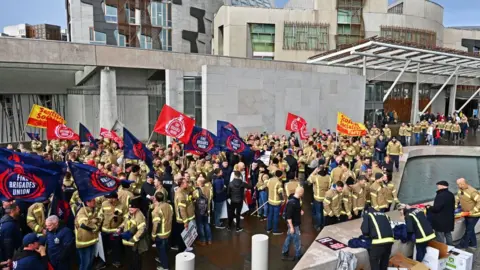No more money to fund public sector pay rises - Swinney
 Getty Images
Getty ImagesThere is no more money to fund public sector pay rises, according to Scotland's finance secretary.
John Swinney told BBC Scotland that although cash had been moved around in the health budget to give NHS staff a better offer, further pay uplifts would mean cuts elsewhere.
A number of groups including teachers and firefighters could strike if pay disputes are not resolved.
Mr Swinney announced £615m of spending cuts in his emergency budget review.
It came on top of £560m cuts to public services in September.
In order to fund the £400m needed to give NHS staff a new pay deal, £38m was taken from the mental health budget, £65m from primary care services and £70m from "social care and National Care Service re-profiling".
Asked whether other workers such as teachers had been put to the back of the queue, Mr Swinney said pay negotiations were ongoing.
He told BBC Radio's Good Morning Scotland programme: "I'm making provision to enable us to afford particular pay deals, that's the prudent thing for me to do.
"But my message of yesterday - and I have no other way other but to communicate it directly and clearly - I have nowhere else to go to fund pay deals other than what the government offers.
"If people are concerned about gravity of decisions yesterday, the next stage to free up more money would have ever more significant consequences and I'm not prepared to do that."
The cost of living in the UK is rising at its fastest rate in 40 years while the Bank of England has predicted inflation will peak at 11%.
Many unions in Scotland have said they want workers' pay to keep in line with inflation - and although the Scottish government said it was committed to fair pay deals, many offers have not matched this target.
Last week, hundreds of firefighters gathered outside the Scottish Parliament to call for higher pay and staffing.
Members of the Fire Brigade Union (FBU) are being balloted on a 5% pay offer - which union leaders are recommending they reject.
 Getty Images
Getty ImagesAnd last month teaching union, the Educational Institute of Scotland (EIS), opened a strike ballot in pursuit of a 10% pay rise, after 94% of members rejected the government's 5% offer.
Andrea Bradley, the union's general secretary, told the BBC that Wednesday's unveiling of spending cuts did not change teachers' thinking "at all" about the pay claim.
She said: "With it's quite sizable budget, [the Scottish government] does still has flexibility to make political choices we think that would much more strongly nurture and support and provide resources for public services, including education.
"The other thing we would like to have seen the Scottish government do before this point is use a greater number of its tax-raising powers and other levers to perhaps have avoided us getting into this type of situation."


This isn't so much a negotiating position as a cry for help from John Swinney.
The finance secretary is effectively backed into a corner. He's cut £1.2bn from this year's budget, much of it to fund pay deals, but it still might not be enough.
He's effectively telling unions not to come back asking for more - but given members are voting for industrial action, many will feel they have to.
Given it too is battling with rising costs and inflationary pressures, the government will be sympathetic to the difficulty many households are in.
And pay deals are, in a way, the ultimate cost of living support measure, putting more money directly into the pockets of workers.
But for all that, Mr Swinney insists that funding for an NHS pay settlement is staying within the health portfolio, it still means less cash for Covid vaccinations, primary care improvement and mental health.
Politics is all about balancing competing priorities. And in lean times the government can only stretch so far to satisfy one area before others begin to snap.

The Scottish Union Trade Congress (STUC) has called on the Scottish government to use its tax powers in 2023 rather than make cuts, a move that opposition parties have supported.
Scottish Labour's Daniel Johnson said: "We believe those with broadest shoulders should always be paying fair share, and that means re-examining tax across the board.
"I would expect UK colleagues to do that and expect the Scottish government to do that."
Craig Hoy, chairman of the Scottish Conservatives, said that although he would not put himself in Mr Swinney's shoes, he believed the choices he had made were the wrong priorities.
He said: "I would support fair pay settlements in public sector in same way I would support a fair taxation system.
"We have to recognise if we want to maintain our public services and we need to borrow our way through some of the issues we're seeing, then you can only do that in three ways - tax rises, public spending cuts or greater borrowing or greater growth."
Asked if he would consider raising tax in the next financial year, Mr Swinney said: "That is of course an option and something I'll consider once I see the UK government's announcements.
"They will shape fiscal context in which we're operating and I will reflect carefully on that."
